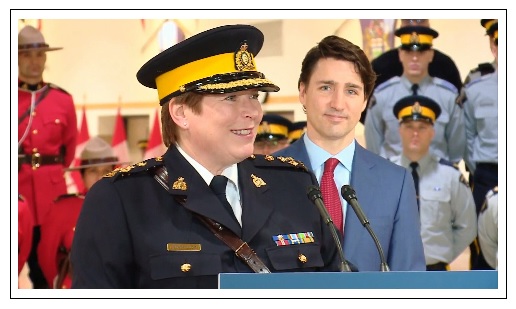True and Fascinating Canadian History

A Mystery of the Mounties:
We Crunch Numbers, Don't We?
by J. J. Healy

In the world of competitive sports and the Olympics too, the final score is the sole factor which decides success and who advances to the next level. Interestingly, parents the world over teach their children that team spirit and enjoyment of the game are more important than a win, but in actual fact, and for the serious minded, it’s the final number or the score which is the single determinant for real success, for the gold medal, and the prizes. And the money.
In Canadian hockey, baseball, basketball and football the win goes to the team with the highest score -- every competitive sports person keeps one eye on the ball and the other eye on the scoreboard. In sporting life, it’s all about the numbers.
All this talk about numbers could easily make one think about policing, and the RCMP, and whether or not the Force keeps a tally sheet for its numbers? Really, has anything changed between the time of the March West in 1874, and the present day? In the end, perhaps no one will be any the wiser, and this could get confusing, but some numbers will be tossed around in the following short story titled, The Mystery of the Mounties: We Crunch Numbers, Don't We? For police officers who are interested, there may be a lesson here too.

The Prime Minister had originally intended to keep the numbers small. The plan for the North West Mounted Police (NWMP) was to march from Manitoba to the Canadian foothills and tame the west. Rumours had reached Ottawa that conditions were spiralling out of control in the west, and there was an urgent need for a mounted unit -- perhaps a couple hundred men -- equipped with firearms to counter the threat of alcohol abuse and the mistreatment of the Indigenous population. It was left to the Prime Minister to approve the actual number of men hired for the new Force.
Across the Maritimes and Quebec, a call went out for recruitment, and within a very short time, the NWMP had reached its goal. The original number rinsed out at about 420 men in total. At the time, the Officer Corps felt strongly that they had selected the most capable of men to withstand the rigours of the March West; every man listed was needed to warm a saddle, each man had been given vital tasks to perform along the route and to ensure success. Total success meant that every man had to show up and be counted, to pull his own weight, to come face to face with true responsibility. No accommodations had been considered if men quit, or deserted, or if men died, or if some were booted out. Unexpectedly, the original number began to dip and ever so quickly. The March West started off with a stumble.

A few men failed to show up the first day after having been signed up; and no one could blame Sub Constable F. B. Marshall for his absence but he died unexpectedly the first day, and Superintendent Theo Richer was charged with insubordination so he quit. The nosedive continued for all sorts of reasons; a few dozen men deserted including Sub Constables Armstrong and Delacourt, and then John Dorgan quit because his father died and Dorgan felt it was necessary to care for his mother and his three sisters. Sub Constable H. Moffatt was demoted so he became disgruntled and he quit, and three more Sub Constables Dugal, Fitzgerald and Harding were all fired due to unsuitability. Constable Charles Young got drunk and accosted the Commissioner, Frank Baster was caught in a blizzard and he died, and Sub Constable John D. Nash was killed accidently.
And that’s only a partial list. The fledgling March West had counted 312 men at first, but as time passed the full quota diminished. Vacancies within the ranks had not been planned, but the falling numbers could not be disputed.
Obviously, there were several dozen men who were fully committed to the March West, but vacancies unquestionably placed an additional burden on each of the men who continued to push westward -- the reductions affected the whole Force as well as each man individually; the Force had not planned on huge vacancies, there were no extra’s to draw on, and there was no backup plan, physical demands increased, men felt demoralized, and overall morale was affected as internal complaints increased. In spite of all the defections and the roadblocks along the way, the March West of 1874 stands as a unique Canadian accomplishment.

Since the March West, various governments have forced the RCMP to cut back. During WWI, the RCMP suffered shortages within its ranks as hundreds of men volunteered for war. Similar shortages can be traced back to WWII; the RCMP ‘Air’ Division and its pilots were absorbed into the RCAF, the RCMP ‘Marine’ Division was absorbed into the Royal Canadian Navy, and a few hundred men volunteered for overseas with the RCMP’s first Provost Corps. All of these shortages placed additional strain on domestic policing because the RCMP’s at-home mandate was broadened to include the protection of federal installations and shipyards.
Even today, when one speaks of personnel vacancies, not a lot has changed. Apparently, staff reductions are just as much a serious issue within police circles now as they were years ago. The numbers are very precise and very revealing.

A recent news report, for instance, said that front line operational Ottawa City Police officers suffer due to the unusual high number of fellow police officers who have been reassigned to administration jobs because of medical reasons. The report noted that 150 officers or 11% of the total number of Ottawa Police Officers are working in the wings, or “ … are, as a result of formal medical accommodations, either doing modified versions of their jobs or entirely different jobs because of medical restrictions.” The number of police officers who are listed as sick, in one form or another, is having a huge negative impact on the police force as a whole and it places higher physical and mental demands on the healthy officers who must carry greater workloads and a significant greater responsibility.

There is no easy solution to the unusual number of vacancies of personnel in the Ottawa City Police. The report said that in the first quarter of this year, 54 police officers had to be reassigned, and 43 of them came from front line operations. The news article reported that a feeling of disgust or distain has crept into the police organization because healthy and committed officers feel they are being cheated since officers who receive special accommodation are reassigned specifically into coveted jobs which block normal career advancement.
The report said, “That means nearly 80% of all the accommodations that require people actually moving to different jobs are happening in the front line.” The downside of all these reductions from the front line translates into officers not having a backup, police officer safety is sacrificed, urgent calls get stalled, and some calls are simply not being actioned.

Vacancies have also created a detrimental effect in community relations because there are fewer police officers on patrol throughout the city, and the normal visibility rate of police officers walking the street has taken a downturn. The news article said, “The force is aware that it needs to have credibility in how it manages accommodations, so that officers, the [police] board, and the public have trust in the organization.” In the end, it is valid to note that it is the community which suffers from inadequate uniformed protection whenever the over all health of the police organization is affected too.
Vacancy statistics inside the RCMP are hard to come by, but one could project that the same health issues affecting the Ottawa City Police might be somewhat similar to what’s happening to the RCMP. Ottawa’s Chief of Police Bordeleau made this comparison, the Chief said, “ ... that he has been told anecdotally by other chiefs that percentages of officers on accommodations appear to be similar across the province and country.” While it’s true that these vacancy rates may hold validity among large police forces in Ontario, the Force does differ to the extent that the RCMP works out of small and mid-sized detachments across Canada, say anywhere from 3 to 30 members. Senior Officers would be expected to take quick action if small RCMP Detachments did not have sufficient RCMP to cover the shifts. And cover them with police officer safely in mind.

Looking back, the reduction rates for the March West are fascinating, and in 1874, the Commissioner's problem was overcome quite simply. He did the job with a skeleton crew, and the men worked with what they had. Today, their names from the March West are legendary; French, Steele, Denny, Aspdin, Bagley, and dozens more. For police officers today, maybe that's the lesson. There's no more money. Be prepared to slim down. Do what you can, and do it well with what you have been given.
And finally a little math quiz. Let’s just suppose you now learn that you have been selected as a new Staff Sergeant for a mid size Detachment in downtown Canada, and you are told that the approved full strength of the Detachment was pegged at 20 RCMP members.

Topped up with zeal, and upon your arrival at the new post, you learn the following statistics about the Detachment; one RCMP was allowed to participate in a year long UN Peacekeeping Operation in the Sudan, two female RCMP are on maternity leave, one RCMP felt harassed by a prisoner and booked off, one RCMP is off duty sick with the flu, two RCMP are away on mandatory Tactical Training, two RCMP are away visiting friends while on stress leave, one RCMP was permitted Leave Without Pay to travel abroad, one RCMP is on paternity leave, one position is vacant but will be filled next year by a new cadet from ‘Depot’, two RCMP are suspended due to assaults and Code of Conduct investigations, one RCMP has broken ribs from skiing and is on disability, and two RCMP are on days off.
It’s time to crunch the numbers.
The end.
Reporting from the Fort,
J. J. Healy
May 2, 2018
Shaamini Yogaretnam. Ottawa Citizen. April 30, 2018. p. A7





